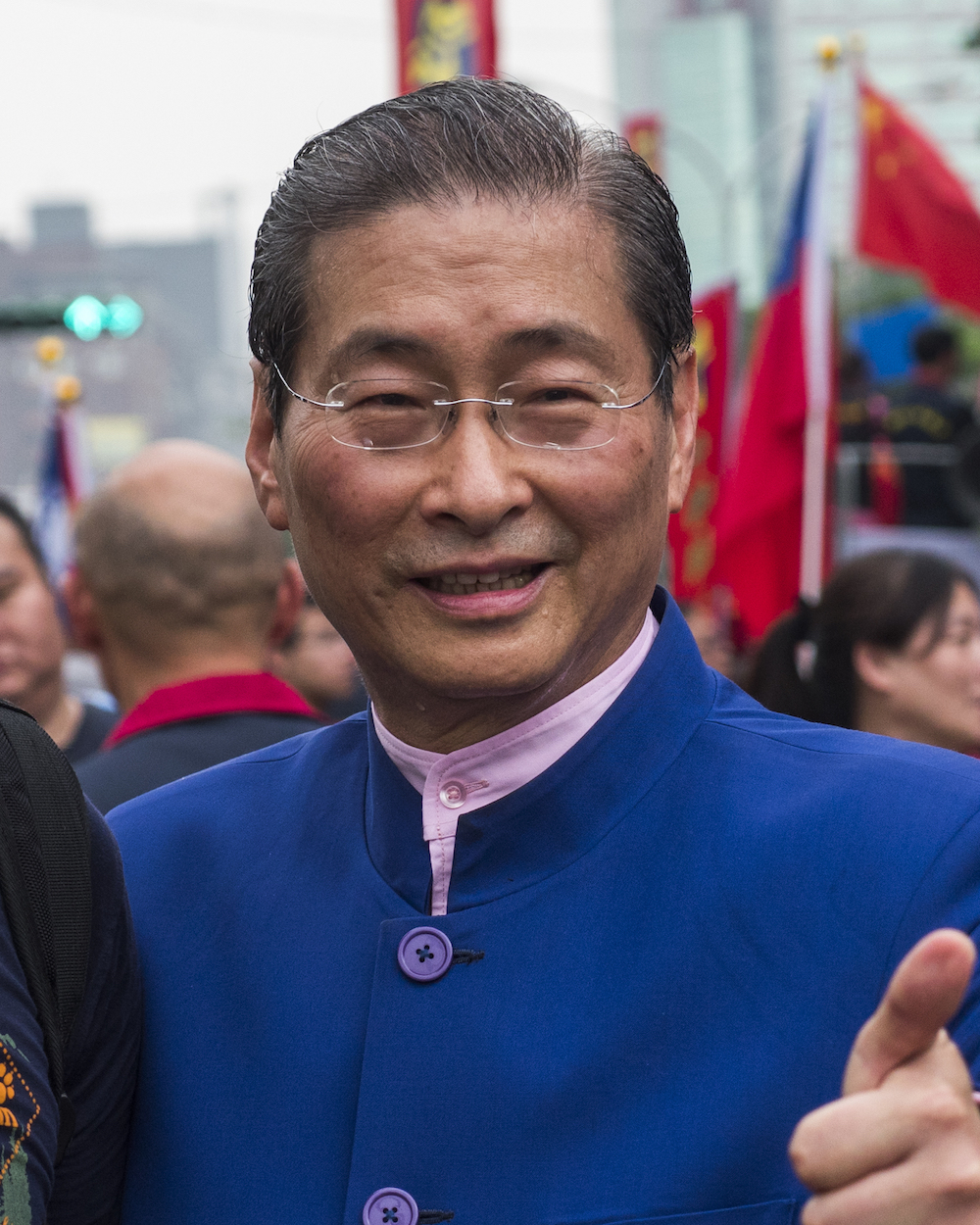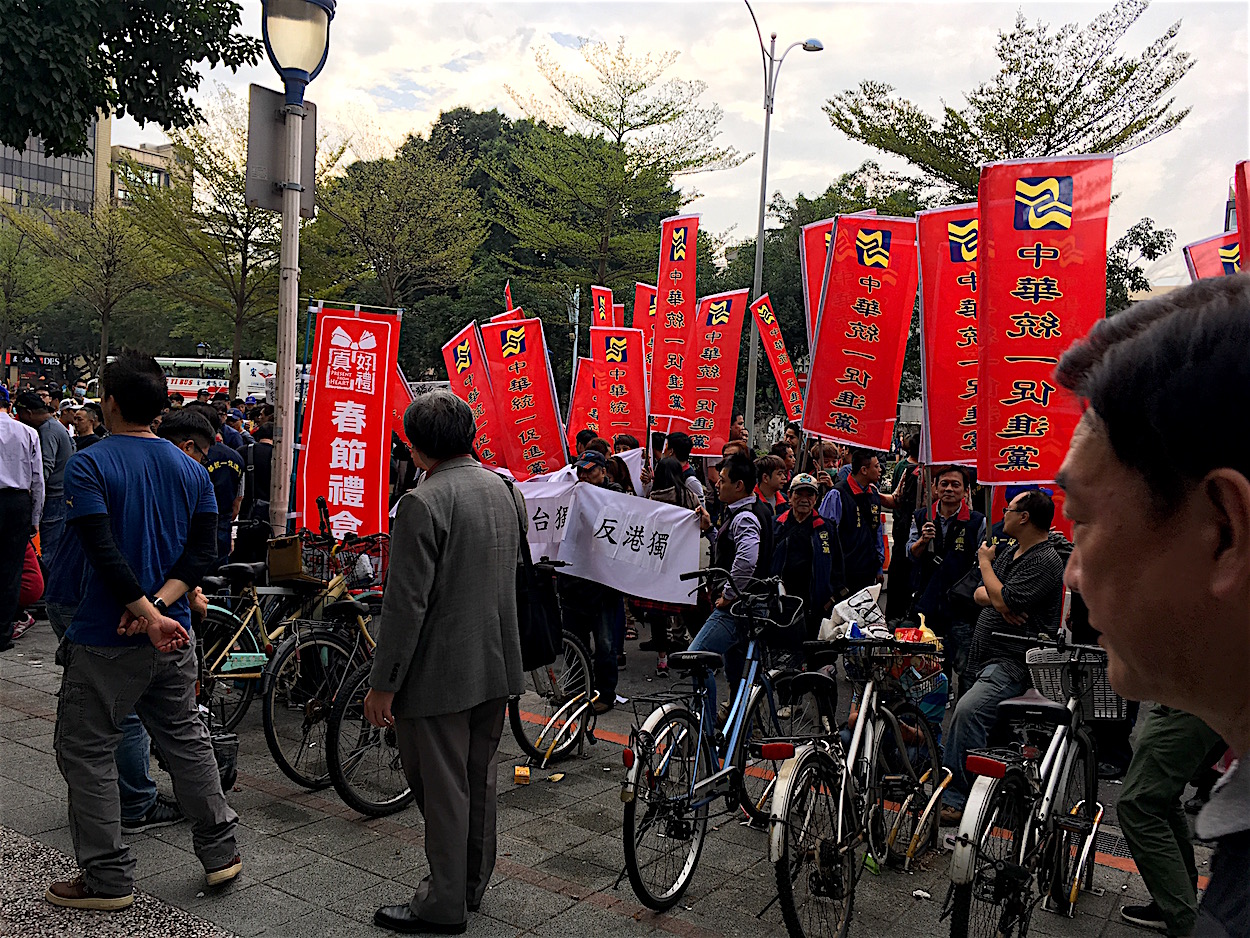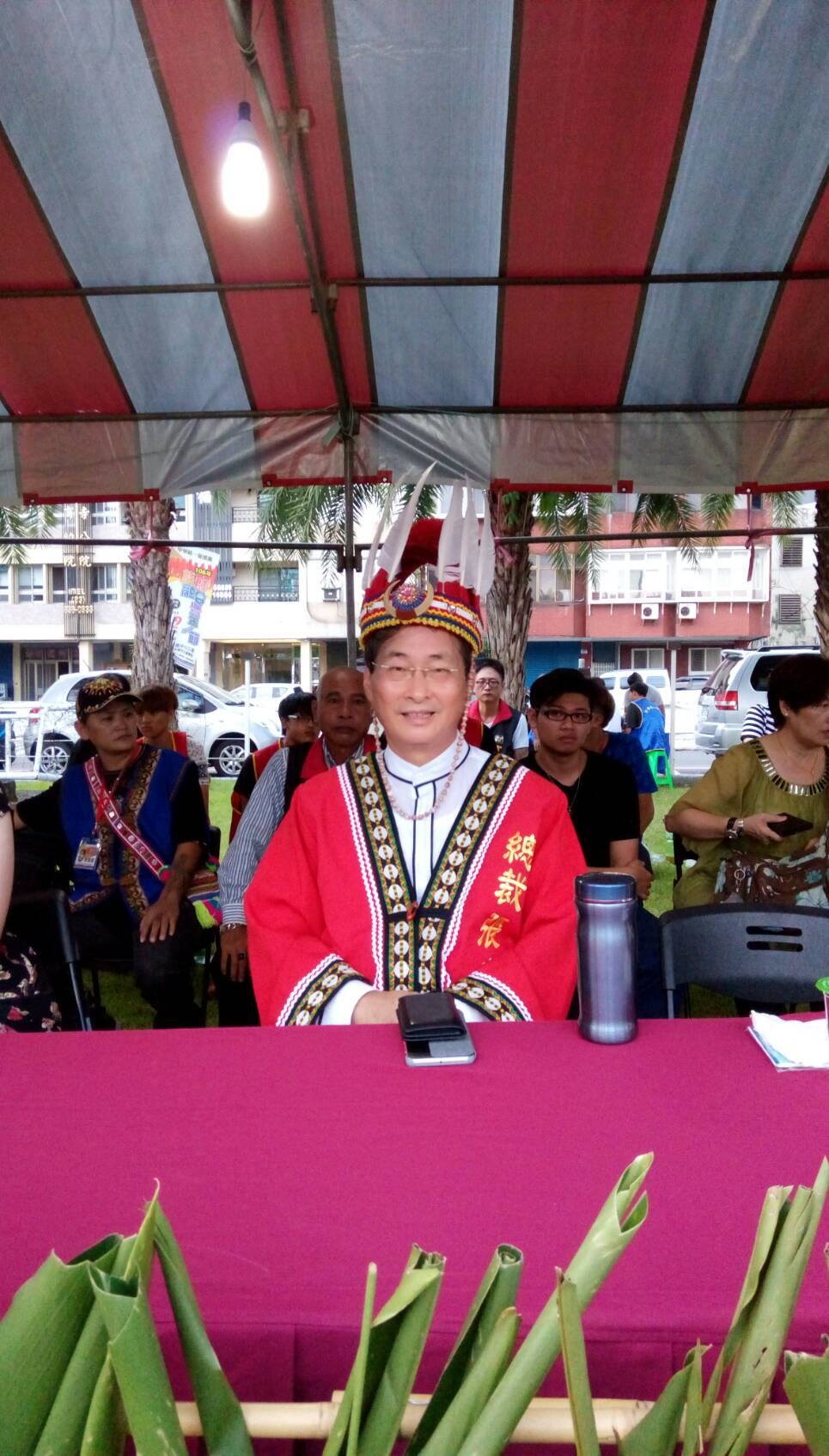by Brian Hioe
語言:
English
Photo Credit: Brian Hioe
A RECENT article in The Diplomat, entitled “The White Wolf of Taiwan”, written by US-based Chinese academic Yun Xia, has provoked ire among many for its apologia for and glorification of “White Wolf” Chang An-Lo, never mind that Chang was a former killer of political dissidents for the KMT, and purported to be the former leader of the Bamboo Union, Taiwan’s largest organized crime group. Or that after entering Taiwanese politics as the founder of the Unification Party (also known as the Chinese Unification Promotion Party or Chinese Unity Promotion Party) following a jail stint in the US for over ten years and a period of exile in China to avoid charges from his past killing of political dissidents, he and his followers have continued to engage in violence against political opponents.
Against the charge that the editors of The Diplomat were unaware of this history on the part of Chang, it is in fact mentioned in the article in a positive light that Chang planned the killing of political dissident Henry Liu, a critic of Chiang Ching-Kuo, who succeeded his father Chiang Kai-Shek as lifetime dictator of Taiwan following his father’s death in 1978. Indeed, very likely what led The Diplomat to publish such an article was not lack of knowledge by the editors regarding Taiwan, but some misguided sense that there are two sides on every issue.
 “White Wolf” Chang An-Lo. Photo credit: Kokuyo/Flickr/CC
“White Wolf” Chang An-Lo. Photo credit: Kokuyo/Flickr/CC
Globally, debate on this fundamental quandary of journalism is probably most prominently seen in current political debates in the United States regarding whether white nationalists or even outright neo-Nazis should be allowed to publish in mainstream media outlets to express their views, in the interest of protecting free speech, free speech and the claim that there are two sides to every issue are the easiest ways to legitimize what constitutes hate speech. Indeed, apart from his history of political violence, Chang’s views in the Taiwanese context can very be understood to constitute racialized hate speech, with his lashing out at Taiwanese, particularly benshengren, as “Han traitors” in the past.
But, as also seen in the United States at present with questions about whether society has become dominated by “alternative facts,” oftentimes it also is that the claim that there are two sides or two views on every issue is a means of giving blatant falsehoods the appearance of legitimacy. This, too, is true of Yun Xia’s article. And so, we might take Yun Xia’s article as a symptom of a larger problem confronting journalism writ large, as well as publications such as The Diplomat which seek to gather analyses of Asian politics which share foundation on a factual basis but come from a variety of political stances.
An inevitable consequence is that such publications will inevitably also receive submissions which are blatant apologism for the Chinese state or other authoritarian states in Asia, dressed up in the garb of views defensible as free speech or analysis. For example, in consideration of Chang’s past as a killer of political dissidents, would The Diplomat have put out articles defending or even celebrating the death of Chinese Nobel Peace Prize laureate Liu Xiaobo? Surely, that too, constitutes a “view”, and one which is no doubt held by a number of Chinese nationalists. But one suspects that they would have not. Why, then, put out apologia for gangsters and killers of political dissidents?
As Yun Xia’s article would have it, Chang An-Lo, the “the founder, face, and soul of the Unification Party,” is an “intriguing figure” who is a pragmatic political candidate as “a unique blend of blue, red, and black” politics in Taiwan, referring to Chang’s advocacy of unification with China but background as a supporter of the KMT traditionally opposed to China. Yun Xia defends Chang against the charge that, as a figure with a background in organized crime, his Unification Party which calls for the immediate unification of Taiwan and China continues to have ties with organized crime, raising the fact that the Unification Party at times provides blankets and rice to disaster-stricken areas, advocates for the rights of Chinese spouses in Taiwan. As Yun Xia has it, Chang has “long ago withdrawn from affairs of the underworld” and broke from the underworld of the Bamboo Union he once led, in part because he opposed the sale of narcotics. On the contrary, the depiction of the Unification Party as continuing to have ties to organized crime are false in nature, and more or less “fake news” by the DPP aimed at discrediting Chang, apparently showing how serious a political threat to the DPP that Chang is.
 Members of the Unification Party demonstrating outside of a forum held with Sunflower and Umbrella movement student activists by the New Power Party. Photo credit: Brian Hioe
Members of the Unification Party demonstrating outside of a forum held with Sunflower and Umbrella movement student activists by the New Power Party. Photo credit: Brian Hioe
Yet Yun Xia has to stretch the truth a great deal in order to make this claim, as well as leave some facts out entirely. Given that, as often reported on in the media, it is obvious fact that Chang is still sighted regularly in public with figures of organized crime, Yun Xia attempts to claim instead that this represents the breadth of Chang’s social ties, stating that his “acquaintances range from the most powerful of the underworld and society’s upper echelons, to the marginalized whom he shelters”.
Against the claim that Chang does not have continue to have extensive ties with the KMT and has struck out on his own, Chang is an associate of Ma Yi-Nan, the older sister of former president Ma Ying-jeou. But even under the Ma administration, in which the Taiwanese police sometimes took a light hand to the Unification Party’s acts of violence, police acknowledged readily that members of the Unification Party had ties to organized crime and had been involved in violent incidents. Likewise, regarding the claim that Chang disapproved of practices such as selling drugs, we do well to remember Chang served ten years in American prison for drug smuggling, during which Chang notably acquired a reputation for erudition through acquiring five bachelor’s degrees and close to two master’s degrees while in prison. Evidence of the Chang family continuing to be involved in organized crime even during Chang’s period of exile in China can be observed in Chang’s son, Chang Chien-ho, being stabbed to death in 1998 in a turf dispute incident between the Bamboo Union gang and Four Seas gang.
And Yun Xia goes out of her way to avoid mentioning the direct acts of political violence in which not only members of the Unification Party, but Chang himself was involved. Members of the Unification Party including Chang threatened to violently evict peaceful student occupiers from the Legislative Yuan during the 2014 Sunflower Movement, arriving in force and beating up demonstrators who ventured too close to inaction from the Taiwanese police, although they did not evict student occupiers in the end. The same event took place a year later, during the student occupation of the Ministry of Education, in which Chang again arrived with threats to violently evict student occupiers.
Of course, evidencing her own decidedly undemocratic mindset, for Yun Xia, peaceful student demonstrations in Taiwan against Chinese encroachment on Taiwanese democracy as part of Chinese territorial claims over Taiwan are simply engineered by the DPP. Yun Xia claims that behind the trend of rising identity “is a meticulously devised de-Sinification process started under Lee Teng-hui’s presidency (1988-2000), which has saturated education, history writing, the registration system, and popular culture.” Apparently, when students participate in social activism, for Yun Xia, this has to be engineered by some social force opposed to China such as the DPP or foreign powers seeking to undermine China, rather than something they do because they believe in a cause.
And violence against student activists are frequent actions threatened or undertaken by the Unification Party, as observed in violent attacks on Falun Gong members, Taiwanese independence activists, and on Hong Kong student activists as Joshua Wong by the Unification Party and demonstrations outside the wedding of Sunflower movement leader Lin Fei-Fan by the Unification Party, because those who demonstrate against China cannot be allowed to even get married in privacy apparently. With rising political violence in Hong Kong against student leaders by pro-China groups, analysts have raised the possibility that the Unification Party will also escalate its violence in the future. The attack on Joshua Wong by the Unification Party was notably led by Chang Wei, Chang An-Lo’s son.
But, again, drawing parallels to the discourse in the United States regarding calls for the demolition of Confederate monuments, Yun Xia attempts to relativize acts of violence by Chang and the Unification Party by pointing to decapitation of Chiang Kai-Shek statues by pro-independence activists, claiming that this represents that it is actually the pro-independence camp which is violent. Never mind that Chiang Kai-Shek was a dictator who killed tens of thousands during his rule and that despite claims about Taiwan’s democratic transition, statues of Chiang Kai-Shek in Taiwan continue to be a monument to past authoritarianism. Or that decapitating statues, after all, inanimate objects, is a wholly different act from gangsters beating up college students.
Lastly, apart from Yun Xia’s glorification of Chang, Yun Xia also goes so far as to claim that Chang represents a pragmatic political future for the pro-unification camp in Taiwan. This would be wishful thinking passed off as reality. Few, even those of the pan-Blue camp, would think that Chang will ever gain any significant political power in China. Rather, Chang is a figure whose only claim to fame is coasting off of past fame for the killing of Henry Liu and who must continue to try and grab media attention with his actions, such as through threats of violence or acts of theater such as demonstrating outside DPP headquarters during 2016 elections while wearing imperial Japanese costumes, the Unification Party seeming much more like a group of anime cosplayers than what is ostensibly a serious political party. Much the same can be said about Chang’s spurious claim recently that Taiwanese indigenous, who are of Austronesian descent, are Chinese and Chang’s taking to dressing up in a combination of traditional Chinese clothing and traditional Taiwanese indigenous clothing—incidentally, as an illustration of Chang’s general political insignificance, as of writing, this incident is probably the last time that Chang made the news in any manner.
It is hardly an opinion, but closer to fact, to assert that it is only to those who have no grasp of Taiwanese politics whatsoever that Chang seems like a serious politician at all. If Yun Xia simply wishes to see a resurgence of pro-unification political forces in Taiwan, Yun Xia would be better served realistically by pinning her hopes on supporters of Hung Hsiu-Chu, another fringe figure in Taiwanese politics defeated by Wu Den-Yih in recent KMT chair elections who nonetheless commands the support of the deep Blue wing of the KMT, to take power in the KMT than by pinning her hopes on Chang An-Lo.
 Chang wearing a combination of Confucian clothing and indigenous Amis clothing while claiming that Taiwanese indigenous were Chinese earlier this month. Photo credit: Kolas Yotaka/Facebook
Chang wearing a combination of Confucian clothing and indigenous Amis clothing while claiming that Taiwanese indigenous were Chinese earlier this month. Photo credit: Kolas Yotaka/Facebook
Chang’s political party won no seats in legislature in 2016 elections, no district representatives, nor does it have any other members who have won political office in 2016 elections. And the party shows zero signs of growth in the close to two years since 2016 elections, seeing as there are no few indicators that the party intends to seriously field any candidates in 2018 local elections even as 2018 is rapidly approaching. Even Chiang Wan-An, the great grandson of Chiang Kai-Shek and a current KMT legislator, and his father Johnny Chiang, the grandson of Chiang Kai-Shek and another current KMT legislator, are in fact much more serious political contenders in Taiwanese politics than Chang. Yet, unfortunately, the publication of a piece such as Yun Xia’s in The Diplomat will be taken as legitimizing ridiculous views of Taiwanese politics as serious analysis. It may be that, again, wishful thinking passes for analysis here; in her ardent hopes for immediate unification between Taiwan and China, Yun Xia has latched onto seeing Chang An-Lo as a serious political force.
Again, one suspects that the reason why the piece was published to begin with was out of a misguided attempt to show “both sides” of an issue. But, if in the present, such views have led to the circulation of a number of questionable views as having factual basis, this is no different in the Taiwanese context or with regard to The Diplomat’s coverage of Asia. Perhaps, as with outrage over a recent article in the Third World Quarterly arguing “The Case for Colonialism.” In most cases, it is probably better to rebut an article than to demand that the article be retracted. But this may be a similar case, as with the publication of “The Case for Colonialism” through what turned out to be a failure of the editorial and peer review process and the eventual publication of the article as an “Viewpoint” piece, never mind that the article claimed to stand on research and factual basis.
One can really only be disappointed that, similarly, a publication with such prestige as The Diplomat would fall into what is more or less the same mistake. Such would be when the attempt to show “both sides” of an issue and be “fair and balanced” ultimately leads to what are not only morally repugnant arguments but also untruths being passed off as the truth.

